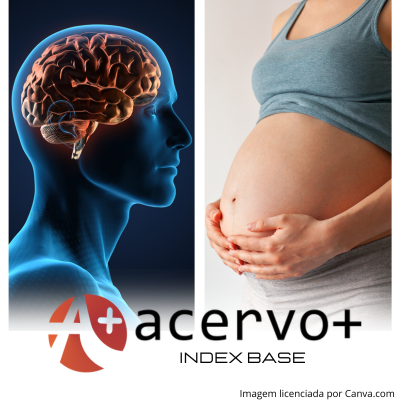Mudanças e alterações no cérebro feminino na gravidez e no pós-parto
##plugins.themes.bootstrap3.article.main##
Resumo
Objetivo: Compreender as alterações neurofisiológicas e comportamentais que ocorrem no cérebro materno durante a gestação, o parto e o puerpério, com foco na neuroplasticidade e suas implicações no vínculo mãe-bebê. Revisão bibliográfica: Foram identificadas modificações estruturais e funcionais em áreas cerebrais associadas à empatia, cognição social, memória afetiva e regulação emocional, como o córtex pré-frontal, a amígdala e o hipocampo. Estudos de neuroimagem demonstram que essas alterações são adaptativas, promovendo uma maior sensibilidade emocional e responsividade ao bebê. Além disso, a revisão considerou a influência de mecanismos neuroendócrinos — especialmente os efeitos moduladores da ocitocina e do estrogênio —, bem como fatores contextuais, como a amamentação e a exposição ao estresse. As evidências sugerem que essas mudanças neurobiológicas desempenham um papel crucial na formação do vínculo afetivo mãe-bebê, favorecendo comportamentos protetores e responsivos que são essenciais para o desenvolvimento saudável da criança. Considerações finais: Pode-se considerar que a maternidade promove uma reorganização cerebral significativa, a qual pode influenciar positivamente o comportamento materno e o desenvolvimento infantil, evidenciando a importância do suporte à saúde mental perinatal.
##plugins.themes.bootstrap3.article.details##
Copyright © | Todos os direitos reservados.
A revista detém os direitos autorais exclusivos de publicação deste artigo nos termos da lei 9610/98.
Reprodução parcial
É livre o uso de partes do texto, figuras e questionário do artigo, sendo obrigatória a citação dos autores e revista.
Reprodução total
É expressamente proibida, devendo ser autorizada pela revista.
Referências
2. BRADSHAW JL, et al. Pregnancy-induced oxidative stress and inflammation are not associated with impaired maternal neuronal activity or memory function. American journal of physiology. Regulatory, integrative and comparative physiology, 2024; 327(1): 35–45.
3. CARCEA I, et al. Oxytocin neurons enable social transmission of maternal behaviour. Nature, 2021; 596: 553–558.
4. CHAMPAGNE FA e CURLEY JP. Neuroendocrine basis of maternal behavior. Advances in Genetics, 2005; 56: 125–147.
5. CHECHKO N e NEHLS S. From pregnancy to postpartum: the dynamic reorganization of the maternal brain. Neuroscience Insights, 2025; 20: 1–3.
6. GRATTAN DR e LADYMAN SR. Neurophysiological and cognitive changes in pregnancy. Handbook of Clinical Neurology, 2020; 175: 25–44.
7. HOEKZEMA EA, et al. Pregnancy leads to long-lasting changes in human brain structure. Nature Neuroscience, 2017; 20(2): 287–296.
8. KIM P, et al. Breastfeeding, brain activation to own infant cry, and maternal sensitivity. Journal of Child Psychology and Psychiatry, and Allied Disciplines, 2011; 52(8): 907–915.
9. KIM P, et al. Human Maternal Brain Plasticity: Adaptation to Parenting. Social Neuroscience, 2016; 11: 574–586.
10. KOSS DM e FRICK KM. Pregnancy-related changes in brain function and behavior: Hormonal modulation of maternal brain plasticity. Frontiers in Neuroscience, 2013; 7: 99.
11. KROL K, et al. Psychological effects of breastfeeding on children and mothers. Bundesgesundheitsblatt, Gesundheitsforschung, Gesundheitsschutz, 2018; 61(8): 977–985.
12. MÜLLER M, et al. Neurobiological mechanisms underlying the development of postpartum depression. Journal of Psychiatry & Neuroscience, 2018; 43(3): 185–197.
13. NEHLS S, et al. Time-sensitive changes in the maternal brain and their influence on mother-child attachment. Translational Psychiatry, 2024; 14(1): 84.
14. ORCHARD ER, et al. Matrescence: Lifetime impact of motherhood on cognition and the brain. Trends in Cognitive Sciences, 2023; 27(3): 302–316.
15. PATERNINA-DIE M, et al. Women’s neuroplasticity during gestation, childbirth and postpartum. Nature Neuroscience, 2024; 27(2): 319–327.
16. PAWLUSKI JL, et al. Less can be more: Fine tuning the maternal brain. Neuroscience and Biobehavioral Reviews, 2022; 133: 104475.
17. PRITSCHET L, et al. Neuroanatomical changes observed over the course of a human pregnancy, 2024; 27(11): 2253–2260.
18. PURI TA, et al. Pregnancy history and estradiol influence spatial memory, hippocampal plasticity, and inflammation in middle-aged rats. Hormones and Behavior, 2024; 165: 105616.
19. RUSSELL JA, et al. Brain preparations for maternity—adaptive changes in behavioral and neuroendocrine systems during pregnancy and lactation. Progress in Brain Research, 2001; 133: 1–38.
20. SPALEK K, et al. Pregnancy renders anatomical changes in hypothalamic substructures of the human brain that relate to aspects of maternal behavior. Psychoneuroendocrinology, 2024; 164.

